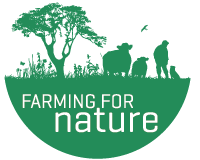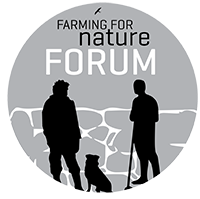Fungi
‘Fungi and farming’ with Thomas O Connor
‘Myco-Farming – what is it and why is it important’
By Thomas O’Connor
MycoFarming is not just about rediscovering the wonders of mushrooms for our farms and environment. It is about improving our understanding of their role in the natural world and building a new relationship with them in our farming and food systems.
 If we want to build more resilient, sustainable and climate-proofed farms we need to drastically reduce our chemical and oil based inputs. Replacing them with nutrients and minerals released from our existing bedrocks and soils by the expertise of a hundred million years of evolution.
If we want to build more resilient, sustainable and climate-proofed farms we need to drastically reduce our chemical and oil based inputs. Replacing them with nutrients and minerals released from our existing bedrocks and soils by the expertise of a hundred million years of evolution.
I find it hard to imagine how we can farm for nature without working with our fungal friends. They are the conductors of our biological systems as:
- Primary digesters of the mineral,
- Recyclers of anything carbon based,
- The spiders web that holds and pulls the soil together,
- Transporter of water, nutrients, minerals and biology,
- The physical communication network of nature. (There was a Wood Wide Web long before a World Wide Web),
- Fermenters of our spirits and foods.


 What are Fungi?
What are Fungi?
Mycilium the living part of the mushrooms we see and the mushroom is the fruiting body. Only a few mycelial networks have fruiting mushrooms. The vast majority are hidden from the naked eye.
Here are 2 good links to get you started.
- Life cycle of a Mushroom: https://www.youtube.com/watch?v=xocJ8jTriZM
- PHC Film: Soil is a living organism: https://www.youtube.com/watch?v=8ugaL6wsXME
At Manna Organic Farm we became obsessed with Myco-Farming right from the start of our farming 15 years ago. The potential seemed obvious but the practice took a while and benefits grow with time. I started by planting loads of trees and biomass to feed my future carbon digesters and soil makers. My first mushrooms were Garden Giant mushrooms to digest the wood chips in the pathways between my beds. You can follow our Garden Giant Journey on FB “ GardenGiantIreland” https://www.facebook.com/GardenGiantIreland/ I also started building carbon rich environments so any locals would also have a home.
In the last few months I’ve inoculated logs of Birch, Alder, Sycamore, Ash and Oak grown on our own farm with Shiitake, Oyster, Lions Mane and Turkey Tail. It’s currently an experiment but also the start of building towards future commercial production.
 Myco Farming is not simply about growing mushrooms for commercial sale. That’s more mushroom farming. You can grow mushrooms without selling them, and still enjoy the economic and ecological benefits of reintroducing a healthy myco-system into your garden, community and farms.
Myco Farming is not simply about growing mushrooms for commercial sale. That’s more mushroom farming. You can grow mushrooms without selling them, and still enjoy the economic and ecological benefits of reintroducing a healthy myco-system into your garden, community and farms.
On our farms Fungi will :
- Digest the bed rock and provide the base minerals that are currently imported at large and increasing costs.
- Reduce erosion and nutrient run off by letting the fungal networks hold our soil together.
- Fix carbon in a more stable form deep into our soils and biological systems.
- Will create an environment where our Nitrogen is held in it most biologically stable form NH4 Ammonium
- Myco-remediation of polluted soils and filtration of run off / effluent.
- Lower the pH below the level at which nitrifying bacteria can operate. More fungi means less weeds.
 The list is long and the potential is huge. So lets engage the Spore drive.
The list is long and the potential is huge. So lets engage the Spore drive.
“Mycelium Running . How mushrooms can save the world” by Paul Stamets is a must if you want to make the most from the amazing potential of Mushrooms, both seen and unseen for your farm, your pocket and the environment. Mycelium Running brings a new perspective on the use of mycelial membranes for ecological health. Linking mushroom cultivation, permaculture, agroforestry, Mycoremediation and soil enhancement.
 If we want to Climate Proof Our farms and communities we need to reduce our dependence on external inputs. We need to reestablish the fungal networks on our farms, fields and environment. They are the catalyst that stabilizes biological systems where they and all their biological communities can thrive; not just in the short term but generation after generation.
If we want to Climate Proof Our farms and communities we need to reduce our dependence on external inputs. We need to reestablish the fungal networks on our farms, fields and environment. They are the catalyst that stabilizes biological systems where they and all their biological communities can thrive; not just in the short term but generation after generation.
We have only started to really understand the role that mycelial networks play and our dependence on them. Its exciting times and i’d recommend getting to know your fungal allies.
Do’s & Dont’s of Myco-Farming.
 Do:
Do:
- Build and add Carbon to your system. Grow biomass / chip for pathways or use RWC (Ramel wood chip) in your pastures.
- Grow hay and higher lignin biomass to compost or cut and drop to feed infield fungal biomass.
- Implement mob grazing, trampling plenty of fungal food on to the pasture.
- Use more static composting piles to create more fungal dominated compost.
- Make compost teas from your compost or collect leaf mould / soil from a near by woodland to inoculate your soil.
- Find a mushroom you like and learn how to cultivate it. On logs or in beds.
- Keep learning about our Fungal friends.
Dont’s:
- Don’t eat a mushroom until your sure you know what it is.
- Tillage is detrimental to the mycelial networks and structure of our soil.
- Fungicides or any other “cide” (death) will kill or inhibit the establishment and growth of our fungal allies.
- Seed treatments prevent early development of the symbiotic relationships of seed, mycelium and biology.
- Application of chemical fertilisers dramatically affects fungal population and density.
Some good youtube clips:
- MYCORRHIZAE: How does the symbiosis take place? https://www.youtube.com/watch?v=zkFrdXSWsoY
- Mycorrhiza: what connects fungus and plants https://www.youtube.com/watch?v=iboE8UZBgkM
- Check out our Manna Organic Store youtube Myco-remediation playlist for more mushroom and farming videos. https://www.youtube.com/watch?v=-3eUsI-CxU8&list=PLWtP1anZs91NrAT9NnkVl6VlMWQftoeDN
About Thomas O’Connor
More information and a short film on Thomas and Claire’s farm here. Ambassador since 2019

